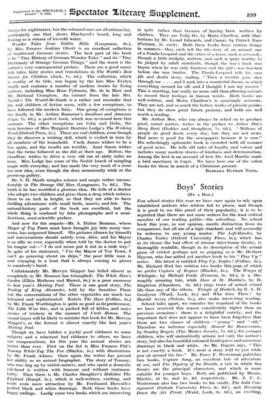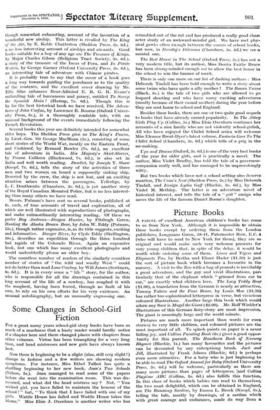Boys' Stories
(By A Boy.)
Foss school stories this year we have once again to rely upon established authors who seldom fail to please, and though it is good to see this proof of their popularity, it is to be regretted that there are not more writers for the least critical member of our reading public—the schoolboy. No school book this year, in our opinion, merits distinction from its companions, but all are of a high standard, and will assuredly be welcome to any young reader. The Left-Hander, by Charles Turley (Oxford University Press, 5s.), which has as its theme the bad effect of intense inter-house rivalry, is thoroughly readable, though in its description of the actual game of cricket perhaps not so gripping as is Mr. Herbert Hayens, who has added yet another book to his " Play Up " series. His latest is entitled Play Up, Eagles ! (Collins, 5s.). Mr. Richard Bird has written two books this year, of which we prefer Captain of Keynes (Mackie, 5s.). The Wasps of Whitegate, by Michael Poole (Pearson, Is. Gd.), is a tho- roughly amusing talc, while Dare at St. Martin's, by D. Stapleton (Chambers, 3s. 6d.) rings truer of actual school life than any of the others. Tringle of llarlech, by R. A. H. Goodyear (Ward, Lock, 5s.) and Who Goes There ? by Harold Avery (Nelson, 5s.), also make interesting reading.
School tales apart, we consider the standard of the books we have received this season considerably higher than on previous occasions : there is a delightful variety, and the important fact does not appear to have been forgotten that there are two classes of children—" young " and " old." Therefore we welcome especially Aboard the Bonaventure, by Stanley Rogers (The Medici Society, 7s. Gd.), for younger children, who will undoubtedly admire not only the author's story, but also his beautiful coloured frontispiece and numerous drawings in black and white. As Mr. Rogers says, " This is not exactly a book. It's more a story told to you while you sit around the fire." Mr. Percy F. Westerman publishes two books, Captain Sang, an excellent talc of adventure at sea, and The Mystery of the Broads, a tale in which Sea Scouts are the principal characters, and which is more suitable for younger boys. Both are published by Messrs. Blackie, at Os. and 3s. 6d. respectively. Mr. J. F. C. Westerman also has two books to his credit, The Gold Con- signment (Oxford University Press, 8s. Gd.), and Bringing Down the Air Pirate (Ward, Lock, 3s. Gd.), an exciting, though somewhat exhausting, account of the invention of a wonderful new airship. This latter is rivalled by The King of the Air, by E. Keble Chatterton (Sheldon Press, 3s. 6d.), a no less interesting account of airships and air-raids. Good books suitable for a boy of any age are The Treasure of Kings, by Major Charles Gilson (Religious Tract Society, 3s. Od.). a story of the treasure of the Incas of Peru, and In Pirate Waters, by George Garner (Oxford University Press, 8s. 6d.), an interesting tale of adventure with Chinese pirates.
It is probably true to say that the cover of a book goes a long way towards guiding the purchaser as to the quality of the contents, and the excellent cover drawing by Mr. Ellis Silas enhances Rear-Admiral E. R. G. R. Evans's enthralling tale of buccaneers and piracy, entitled To Sweep the Spanish Main ! (Harrap, 7s. 6d.). Though this is by far the best historical book we have received, The Adven- tures of John Carfax, by Lawrence R. Bourne (Oxford Univer- sity Press, 5s.), is a thoroughly readable tale, with an unusual background of the events immediately following the French Revolution.
Several books this year are definitely intended for somewhat older boys. The Sheldon Press give us The King's Pawns, by Lieut.-Gen. Sir George MacMunn (5s.), consisting of some short stories of the World War, mostly on the Eastern Front, and Cashiered, by Bernard Bowles (7s. 6d.), an excellent tale of adventure in India. His Majesty's Shirt-Sleeves, by Pousse Cailloux (Blackwood, 7s. 6d.), is also set in India and well worth reading. Derelict, by Joseph T. Shaw (Knopf, 7s. 6d.), tells the story of the activities of three men and two women on board a supposedly sinking ship. Deserted by the crew, the ship is not lost, and an exciting situation arises between the passengers. Yellerlegs, by L. C. Douthwaite (Chambers, 3s. 6d.), is yet another story of the Royal Canadian Mounted Police, but is no less interest- ing than many others we have read.
Messrs. Putnam's have sent us several books, published at 6s. each, of true accounts of travel and exploration, all of which are well illustrated with reproductions of photographs, and make extraordinarily interesting reading. Of these we prefer Roy Andrews—Dragon Hunter, by Fitzhugh Green, Hunting the Alaska Brown Rear, by John W. Eddy (Putnam, ISs.), though rather expensive, is, as its title suggests, exciting and informative. Danger River, by Clyde Eddy (Skeffington, 18s.), describes an expedition through the three hundred bad rapids of the Colorado River. Again an expensive book, but one which has many excellent photographs and would undoubtedly please an older boy.
The countless number of readers of the similarly countless number of stories of " the wild and woolly West " could not do better than read Lone Cowboy, by Will James (Scribners, 8s. 6d.). It is in every sense a " life " story, for the author, who is responsible for all the drawings contained in this long account of the life of a cowboy, has roughed it with the roughest, having been forced, through no fault of his own, to rely on his own efforts for his very existence. An unusual autobiography, but an unusually engrossing one.



























































 Previous page
Previous page